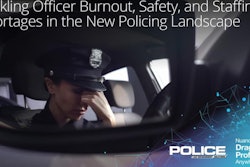![[|CREDIT|]](https://img.policemag.com/files/base/bobit/publicsafety/image/2022/08/pm.gedsc_0121-2.jpg?auto=format%2Ccompress&fit=max&q=70&w=400)
We all talk about how important “officer safety” is and how much law enforcement is a family, that being said I don’t think we are walking the talk.
I used to interject in these conversations that if we truly cared about officer safety, we wouldn’t send anyone to calls. Of course, that was said in jest, but it was meant to spur thought and conversation on risk management or the mitigation of the risks inherent in the profession.
Many years ago while serving as commander of my agency’s traffic unit, I was convinced to go through motor school. (As an aside, that was the toughest school I ever attended, not even basic SWAT was as tough.) My agency’s instructors were also certified driving instructors. The department had been hiring again and the combination of new officers and too much time since the last agencywide driving training resulted in an increase in accidents.
On a break the instructors were talking about how crazy some of the new folks were driving. I sat back and listened to the conversation between the sergeant and the officers talking about the need to run another session of training and hopefully that would straighten things out or “admin” would end up disciplining folks. At that point I decided to interrupt. I simply asked, “How is this my problem?” I got puzzled looks. So, I tried another approach. “Look my office is on the fourth floor of HQ. I don’t care how hard someone tries, they aren’t getting a cruiser up there and running me over. But y’all might get hit by them.” I saw a few light bulbs go off for some of then but not for everyone.I told them that if they didn’t care enough about their co-workers to counsel them, then shouldn’t they at least worry about themselves enough to do it? Isn’t self-preservation worth it? I could tell not everyone understood my point.
At this point I told the confused instructors that they didn’t really care about their co-workers. I deliberately got them mad because their response was the usual outrage, and they replied that of course they cared, they would die for each other, and all that.
I called BS. If they truly cared about their co-workers, then they would counsel those co-workers and stop them from driving crazy. A lieutenant or higher would never get involved. If they really cared about their co-workers, they would go to their sergeant if someone didn’t respond to peer counseling and the sergeant would have a “come to Jesus” moment with them.
Ultimately, it is everyone’s responsibility in law enforcement to police each other. Everyone has a story about Officer X who is too aggressive, or drives too fast, or can’t write a report, or turns every hostile encounter into a fight. As my good friend “Gordo” loves to say, predictable is preventable. How does everyone know it, but no one addresses it? I call that cowardice and truly not caring about someone. If you see a problem lying in wait. It’s time to say something.
I know most of you will respond to this by saying, “It’s not my job to discipline. I am not a supervisor.” What I hear is you don’t care about your co-workers or yourself.Stop thinking that discipline is a bad thing. It is official “corrective action.” If you see a fellow officer violating policy and training, they may be doing more than risking “punishment;” they may be risking their safety or yours.
If you truly care, you have to say something. Pull them aside explain the why and address it. If they don’t respond go to a supervisor. Ultimately, if you are a supervisor and the officer can’t make the adjustment then hold them accountable and show them the door. That isn’t failure. You may have saved their life or your own.
I used to tell new sergeants that they needed to realize their role was not that of an older brother. Big brother would keep you alive as much as possible but would break the rules with you. Sergeants are “Dad” they must care enough to put a boot in the ass to raise the child (officer). The worst thing you can do is allow someone who is unsafe or violates the rules to remain in the agency.
If you truly care, if you truly believe in officer safety, then you have to be willing to call out unsafe behavior and dangerous policy violations. Address it, discipline it, and if necessary, “punish” it. If you can’t do that you don’t even seem to realize you are not interested in protecting yourself.
I hope you read this and get angry. Then I hope you really think about it. I believe if you do, you will “get it”
David Schnurstein is a 25-year veteran of law enforcement. He retired as the Commander of the Emergency Communications, Records & Technology Division for the Grand Rapids (MI) Police Department.











